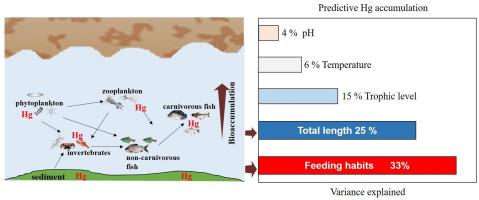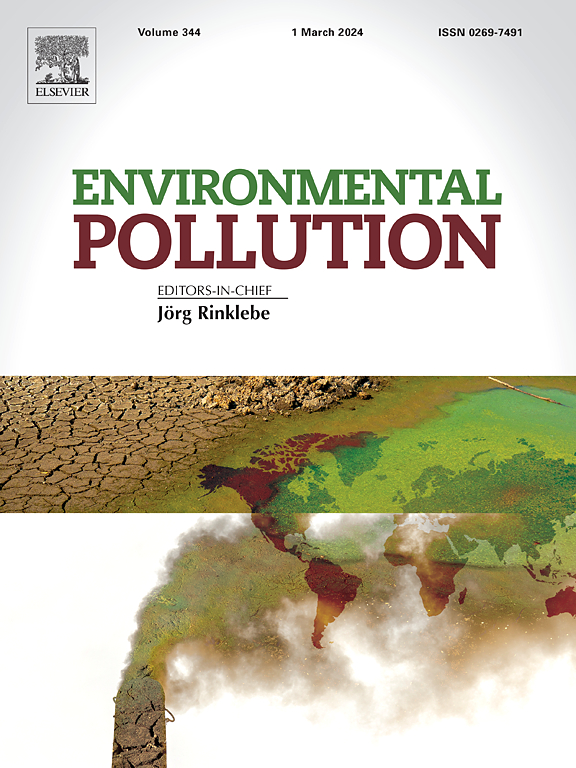Influence of environmental and biological factors on mercury accumulation in fish from the Atrato River basin, Colombia
IF 7.6
2区 环境科学与生态学
Q1 ENVIRONMENTAL SCIENCES
引用次数: 0
Abstract
Understanding variations in total mercury (T-Hg) levels in fish is crucial for protecting aquatic biota and human health. This article evaluates the influence of environmental factors (temperature, pH) and biological variables (feeding habits, trophic level, total length, total weight), on T-Hg concentrations in fish from the Atrato River basin, Colombia. Utilizing a robust secondary data set of 842 fish samples from 16 species collected in 2019, we conducted a comprehensive analysis of these influences. We examined differences in T-Hg accumulation rates by habitat type (pelagic, benthopelagic and demersal) and probabilistically classified species based on their feeding habits and trophic levels. Our analysis identified a hierarchy of variables influencing T-Hg levels: feeding habits > total length > estimated total weight > trophic level > water temperature > pH, with temperature being the only predictor exerting a negative influence. Together, these variables accounted for over 60% of the variability in T-Hg accumulation in fish muscle tissue. Furthermore, fish in the Atrato River exhibited differential T-Hg based on habitat type, grouping into three distinct subpopulations stratified by feeding habits and trophic levels. These findings suggest that observed T-Hg accumulation patterns are driven by the functional ecology of the organisms, phenological characteristics, metabolism, contamination patterns, biogeography, land use, and the spatial and chemical configuration of the environmental matrices of the basin. Our results emphasize the importance of understand how biological and environmental factors influence T-Hg concentrations in fish, as these factors vary across aquatic systems. This knowledge is crucial for developing effective biodiversity management strategies. While we used a machine learning approach to identify key predictors of T-Hg accumulation, we also caution against potential biases in modeling T-Hg concentrations for aquatic biota management.

环境和生物因素对哥伦比亚阿特拉托河流域鱼类体内汞积累的影响
了解鱼类体内总汞(T-Hg)含量的变化对保护水生生物群和人类健康至关重要。本文评估了环境因素(温度、pH 值)和生物变量(摄食习惯、营养级、总长度、总重量)对哥伦比亚阿特拉托河流域鱼类体内总汞浓度的影响。我们利用 2019 年采集的 16 种鱼类的 842 份样本组成的强大二级数据集,对这些影响因素进行了全面分析。我们研究了不同生境类型(浮游、底栖和底栖)在 T-Hg 积累率方面的差异,并根据鱼类的摄食习惯和营养级对其进行了概率分类。我们的分析确定了影响 T-Hg 水平的变量等级:摄食习惯、总长度、估计总重量、营养级、水温、pH 值,其中温度是唯一产生负面影响的预测因子。这些变量加在一起占鱼类肌肉组织中 T-Hg 积累变化的 60% 以上。此外,阿特拉托河中的鱼类因栖息地类型不同而表现出不同的 T-Hg,并根据摄食习惯和营养水平分为三个不同的亚群。这些研究结果表明,观察到的 T-Hg 积累模式受生物的功能生态学、物候特征、新陈代谢、污染模式、生物地理学、土地利用以及流域环境基质的空间和化学结构等因素的影响。我们的研究结果强调了了解生物和环境因素如何影响鱼类体内 T-Hg 浓度的重要性,因为这些因素在不同的水生系统中各不相同。这些知识对于制定有效的生物多样性管理策略至关重要。虽然我们使用机器学习方法确定了 T-Hg 积累的关键预测因子,但我们也要警惕在为水生生物群管理建立 T-Hg 浓度模型时可能出现的偏差。
本文章由计算机程序翻译,如有差异,请以英文原文为准。
求助全文
约1分钟内获得全文
求助全文
来源期刊

Environmental Pollution
环境科学-环境科学
CiteScore
16.00
自引率
6.70%
发文量
2082
审稿时长
2.9 months
期刊介绍:
Environmental Pollution is an international peer-reviewed journal that publishes high-quality research papers and review articles covering all aspects of environmental pollution and its impacts on ecosystems and human health.
Subject areas include, but are not limited to:
• Sources and occurrences of pollutants that are clearly defined and measured in environmental compartments, food and food-related items, and human bodies;
• Interlinks between contaminant exposure and biological, ecological, and human health effects, including those of climate change;
• Contaminants of emerging concerns (including but not limited to antibiotic resistant microorganisms or genes, microplastics/nanoplastics, electronic wastes, light, and noise) and/or their biological, ecological, or human health effects;
• Laboratory and field studies on the remediation/mitigation of environmental pollution via new techniques and with clear links to biological, ecological, or human health effects;
• Modeling of pollution processes, patterns, or trends that is of clear environmental and/or human health interest;
• New techniques that measure and examine environmental occurrences, transport, behavior, and effects of pollutants within the environment or the laboratory, provided that they can be clearly used to address problems within regional or global environmental compartments.
 求助内容:
求助内容: 应助结果提醒方式:
应助结果提醒方式:


